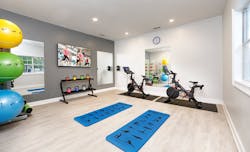Does your multifamily property have Peloton bikes in its fitness center? If so, hang onto them for dear life. They may be the last ones you’ll ever see. The reason: Peloton will no longer sell its bikes to multifamily residential communities.
Let me go back a bit to explain.
On August 19, I received an email from Matt Shaia, Director, Asset Management and Support, Weinstein Properties, Glen Allen, Va. He had just read our MULTIFAMILY Design+Construction “Amenities Survey 2019” and remarked at the significant percentage of respondents – one in five (19.1%) – who said they had installed Peloton bikes in their properties in the last few years.
“In 2018 we did start incorporating Peloton bikes in some of our fitness centers,” Shaia wrote me. “These were purchased set up on commercial accounts which essentially allowed for unlimited users. Back in June of 2019, we were told that Peloton will no longer sell to commercials customers. This was a big let down to us as we have found spinning to be gaining significant popularity in the fitness amenity world.”
Peloton responds to apartment community developer
I learned from Shaia that, last May, a Weinstein Project Coordinator had emailed her local Peloton sales contact seeking to place an order for more Peloton bikes. On May 13, the saleswoman, Chris Jobes, replied: “I am glad your residents have enjoyed your Peloton Bikes and that you wish to place another order. Unfortunately, we have recently discontinued commercial sales to multi-family housing developments.”
“Rest assured,” Jobes continued, “this change does not affect your existing Peloton Bikes. Each Bike will continue to receive content, software updates, warranty, support, and service outlined in your original commercial sales order and current subscription.
“While this was a very difficult decision to reach, it returns focus to our original model of bringing high quality, instructor-led fitness into our Members’ homes. We have learned that the best Peloton experience begins with a Member purchasing and exercising on his or her own personal Bike.”
Jobes went on to state that Peloton bikes would “continue to appear in certain commercial settings so Members may stay connected to their fitness routines while away from their homes,” presumably for work or personal travel.
Jobes then offered Weinstein Properties an option: “Should your residents wish to purchase a Peloton Bike for individual household use, we are happy to complete deliveries to their personal address.” Note: According to Peloton’s website, a Peloton bike can be purchased for $2,245 or $58/month for 39 months at 0% APR. “Membership separate,” according to onepeloton.com.
In contradiction to her previous statement that existing Peloton Bikes would receive warranty and support, however, Jobes raised a point about any new—she called them “refreshed”—warranties for existing Peloton bicycles: “Please note our refreshed Bike warranty expressly excludes service and part coverage for Bikes in fitness and recreational spaces at multi-family residential developments; however, individual household delivery and use is fully covered.”
The Weinstein Project Manager wrote back to Jobes, asking: “Does this mean you would no longer sell us products or that you will no longer sell us a commercial subscription? Would we still be able to purchase the equipment with individuals needing to buy their own subscription?” Jobes replied, “We’ve discontinued new commercial sales, however any bikes that you do have in your fitness centers will receive the same service and ability to renew the subscription.”
In mid-August, the Weinstein PM emailed Jobes again – “Peloton has been brought up again in our talks as we continue to update and renovate some of our fitness centers” – and asked if Peloton might be “offering commercial sales again.”
Jobes’s reply: “While we are currently offering our products in commercial spaces, we are not in multifamily housing / apartment complex gyms. I apologize for any confusion!” In a subsequent email, she offered yet another option: “While I would love to grandfather in certain people/locations/companies for additional purchases, my hands are pretty much tied on this subject. To clarify – if you wanted to replace any old existing bikes with a new one, we would be able to help with this, but we would not be able to exceed the original quantity for a property.”
Disappointed (“Oh no Chris, I was really hoping you were going to give me a different response”), the Weinstein PM asked for a reason for the policy change, especially “considering the growing trend with products like FOD, Expresso Bike, Mirror who are offering subscription accounts to multifamily gyms.”
On August 20, Jobes responded, “This was a strategic decision to shift our focus back to providing bikes in locations where our members work, play and stay – corporate wellness facilities, country clubs, and hotels – to keep them connected with Peloton while on the go.” Jobes promised to be in touch “should anything change,” and apologized “for any inconvenience!” Weinstein Properties, Jobes assured the PM, had been “a great partner to work with.”
PELOTON'S apartment market penetration
Meanwhile, in response to Shaia’s August 19 email to me, I emailed Jessica Kleiman, Peloton’s Senior Vice President, Global Communications, and Carolyn Tisch Blodgett, Senior Vice President, Head of Global Brand Marketing, citing Shaia’s concerns and noting the 19.1% Peloton market penetration among our MFDC Amenities Survey participants.
I never heard directly from Kleiman or Tisch Blodgett, but Peloton’s public relations agency, ID PR, sent this statement from Peloton:
Our core business is providing over 1 million Members globally with access to thousands of classes from the comfort of their homes, on the go with Peloton Digital, and in select commercial settings.
While we have sold thousands of Peloton Bikes for shared use and will continue to support the many residential buildings that already have Peloton Bikes in their gyms, moving forward our commercial sales strategy will focus on hotels, corporate wellness facilities and private clubs.
That’s where it rests today. Peloton is out of the multifamily market, at least for new customers and existing customers who want to add Peloton bikes.
In a phone discussion, Shaia called Peloton’s new strategy ill conceived. He said that the average tenure for most renters is 2-3 years, during which they would have the opportunity to get hooked on Peloton cycling in the apartment community’s fitness center. As they left and moved to home ownership in the future, Shaia noted, many would carry over their apartment experience to their home gyms or workout areas and buy a Peloton bike and membership.
Related content: Top 10 outdoor amenities in multifamily housing for 2019
Related content: Top 10 indoor amenities in multifamily developments for 2019
In other words, Shaia told me, the reality is that multifamily community operators are paying Peloton to provide exposure to the Peloton brand to tens, if not hundreds of thousands of apartment and condominium residents.
One thing that occurred to me later: Does Peloton’s ban on multifamily sales also apply to student housing?
Are you a Peloton customer? I’d be glad to hear thoughts about this situation: [email protected].
P.S. For those readers born after 1975, the headline refers to a speech by President Gerald Ford before the National Press Club in Washington, D.C., in which Ford vowed the federal government would never bail out New York City from near bankruptcy. The next day, the Daily News blurted the front-page headline “Ford to City: Drop Dead.” Ford didn’t use those words, but they are all that anyone remembers about the speech.
About the Author

Rob Cassidy
Robert Cassidy is Executive Editor of Building Design+Construction and the Editor of Multifamily Design+Construction. A city planner, he is the author of several books, including “Livable Cities,” and was a co-founder of the Friends of the Chicago River.
